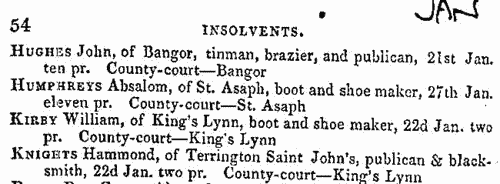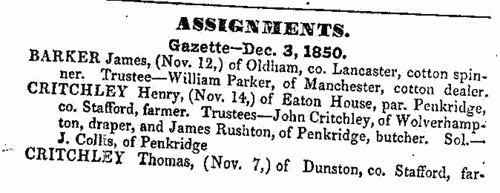Dobbing Surname Ancestry ResultsOur indexes 1000-1999 include entries for the spelling 'dobbing'. In the period you have requested, we have the following 31 records (displaying 11 to 20): Single Surname Subscription | | | Buying all 31 results of this search individually would cost £176.00. But you can have free access to all 31 records for a year, to view, to save and print, for £100. Save £76.00. More... |
These sample scans are from the original record. You will get scans of the full pages or articles where the surname you searched for has been found. Your web browser may prevent the sample windows from opening; in this case please change your browser settings to allow pop-up windows from this site. Dissolutions of Partnerships
(1843)
Trade partnerships dissolved, or the removal of one partner from a partnership of several traders, in England and Wales
DOBBING. Cost: £6.00.  | Sample scan, click to enlarge

| Insolvents
(1843)
Insolvency notices for England and Wales: insolvency often caused people to restart their lives elsewhere, so these are an important source for lost linksDOBBING. Cost: £6.00.  | Sample scan, click to enlarge

| Insolvents imprisoned for debt in England and Wales
(1851)
Perry's Bankrupt and Insolvent Gazette, issued monthly, included brief notices of insolvents' estates surrendered to assignees. Each entry gives the surname and christian name of the insolvent, trade and address, followed by the name of the prison. This is the index to the names of the insolvents, from the issues from January to December 1851.DOBBING. Cost: £6.00.  | Sample scan, click to enlarge

| Insolvents in England and Wales
(1851)
Perry's Bankrupt and Insolvent Gazette, issued monthly, included lists of insolvencies and stages in the process whereby the insolvents petitioned for release from debtors' prison. The insolvent is generally referred to by name (surname first), address and trade. This is the index to the names of the insolvents, from the issues from January to December 1851.DOBBING. Cost: £6.00.  | Sample scan, click to enlarge

| Trustees and solicitors in England and Wales
(1851)
Perry's Bankrupt and Insolvent Gazette, issued monthly, included lists of assignments of bankrupts' estates. Each entry gives the name of the bankrupt (surname first, in capitals), the date (in brackets), address and trade; followed by the names and addresses of the trustees to whom the estate was delivered, and the name and address of the solicitor. This is the index to the names of the trustees and solicitors, from the issues from January to December 1851.DOBBING. Cost: £6.00.  | Sample scan, click to enlarge

| Gentry in London
(1856)
The Post Office London Directory for 1856 includes this 'Court Directory', listing alphabetically by surname and christian name the upper class residents of the capital with their postal addresses. 'In order to afford space for the addresses, the abbreviation "esq." for esquire has no longer been appended to each name in the Court Directory. It should be understood that such should be added to the name of every gentleman in the following pages to which no inconsistent addition is affixed.' Decorations, honours &c. are generally given. Some gentlemen appear who are also listed (as professional men, &c.) in the commercial section. Those with second residences in the provinces usually have the country address given as well.DOBBING. Cost: £4.00.  | Sample scan, click to enlarge

| Unclaimed Money and Property
(1870)
Gun & Co. of 6 Prince of Wales' Road, London, in about 1870 published this fifth 'List of Next of Kin & Heirs, &c., who have been Advertised for in the English, Irish, Scotch, United States of America, Canadian, Australian, East and West Indian, and other Newspapers, since 1704. Money & Property to the value of many Millions Sterling want Claimants'. The list of 4,128 names gives surname, christian name, and, occasionally, locality. Copies of the actual advertisements were furnished to enquirers by the company at a cost of six shillings. DOBBING. Cost: £6.00.  | Sample scan, click to enlarge

| Missing Next-of-Kin and Heirs-at-Law
(1880)
The Unclaimed Money Registry and Next-of-Kin Advertisement Office of F. H. Dougal & Co., on the Strand in London, published a comprehensive 'Index to Advertisements for Next of Kin, Heirs at Law, Legatees, &c., &c., who have been Advertised for to Claim Money and Property in Great Britain and all Parts of the World; also Annuitants, Shareholders, Intestates, Testators, Missing Friends, Creditors or their Representatives, Claimants, Unclaimed and Reclaimed Dividends and Stock, Citations, Administrations, Rewards for Certificates, Wills, Advertisements, &c., Claims, Unclaimed Balances, Packages, Addresses, Parish Clerks' Notices, Foreign Intestates, &c., &c.' The original list was compiled about 1860, but from materials dating back even into the 18th century: most of the references belong to 1850 to 1880. For each entry only a name is given, sometimes with a placename added in brackets: there may be a reference number, but there is no key by which the original advertisement may be traced. The enquirer of the time had to remit £1 for a 'Full and Authentic Copy of the Original Advertisement, together with name and date of newspaper in which the same appeared'. DOBBING. Cost: £4.00.  | Sample scan, click to enlarge

| Money lenders and other creditors
(1880)
Bills of sale transferred title in all property of a debtor to a specified creditor. Possession of a bill of sale thus protected a money lender or other creditor from losing a debtor's property to other creditors (except landlords) in case of insolvency or bankruptcy; and in many cases signing a bill of sale was a required step for a borrower securing a loan. The bill of sale specified the amount thereby secured, but could be open, i. e., allow for further drawings on the same account. Entries from the official register of bills of sales in England and Wales were published in Flint & Co.'s London Manchester and Dublin Mercantile Gazette, a weekly publication available only by subscription, issued under the motto "Security in Crediting". The entries are listed by county, then alphabetically by debtor, surname first, with address, trade, the name of the creditor ('in whose favour'), dates of issue and filing, and amount. An &c. after the amount indicates an open bill. The creditors that appear in the 'in whose favour' column are mainly, but not exclusively, loan companies and individual money lenders, and Jewish names figure prominently among the latter. When a loan was paid off, satisfaction of the bill of sale was entered on the register, and these satisfactions are also recorded in these pages. 1 January to 31 March 1880.DOBBING. Cost: £6.00.  | Sample scan, click to enlarge

| Bankrupts, Assignees, Trustees and Solicitors
(1881)
Bankruptcy notices in England and Wales, October to December 1881DOBBING. Cost: £6.00.  | Sample scan, click to enlarge

|
Research your ancestry, family history, genealogy and one-name study by direct access to original records and archives indexed by surname.
|












